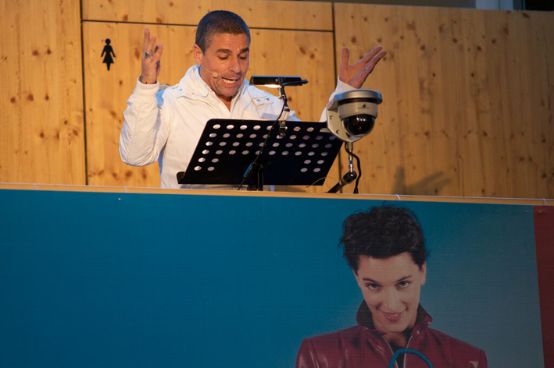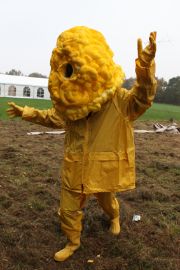The deliberate, the curious, the scattered
From October 16 to 18, the Donaueschingen Music Days were characterized by farewells and (soon) new beginnings.

Eight trombones in a church - that sounds good. Filling the space, supported by longer reverberation times, the sound of these Preamblewhich the Austrian composer Georg Friedrich Haas wrote for the Trombone Unit Hannover. Haas is a fanatic for detail. He controls sophisticated microtonal soundscapes like hardly anyone else. What many regard as mere ornamentation becomes the main compositional focus in the sense of Haas' musique spectrale: the fine intermediate tones between semitones, those quarter, sixth and eighth tones for which a continuously intoning trombone is better suited than a church organ.
This opening concert symbolically anticipated the Donaueschingen Music Days. As a place of funerals and weddings, the church performance venue stands for farewells and new beginnings. Here, the sad farewell to the previous festival director Armin Köhler, who died in 2014. On the other, the hopeful beginning of Björn Gottstein's tenure as the new curator of the Donaueschingen Music Festival. Gottstein's signature is not yet apparent in musical terms. The programs are largely fixed until 2017 - also because large ensemble and orchestral scores take time. After that, Gottstein wants a more international focus for the Music Days, which have so far been too Central European in character. In addition, female composers are to be given more prominence - an understandable and commendable concern given that only Olga Neuwirth was represented this year.
Too little convincing
Olga Neuwirth's spatial composition Le Encantadas o le avventure nel mare delle meraviglie for six ensemble groups distributed around the room, samples and live electronics did not fulfill everything the composer had reported in the program book. The 70-minute work was supposed to be about electronic imitations of certain spatial effects, such as those of the Venetian church of San Lorenzo. Despite the enormous technological effort involved, this is hardly comprehensible. Especially not for anyone sitting directly next to one of the many loudspeakers and not in the middle of the hall. It is nothing new that an interesting concept is not realized in terms of sound. Neuwirth's composition was convincing in other respects: in the fine sound work, in the sense of development and also through sublime spatial effects, reminiscent of those mentioned by Neuwirth. Prometeo Luigi Nono.
High art was in short supply this year. If out of 18 world premieres only a maximum of three good works jump out - including Mark Barden's fantastic aMass for amplified ensemble, Mark André's clarinet concerto about and Neuwirth's composition - then that is not enough. The orchestral concerts were particularly disappointing. Why the Italian composer Francesco Filidei made such a childish reference to Johann Sebastian Bach remains his secret. Filidei writes that he wanted to take the most perfect thing he knew on earth by the horns and attack it. Killing Bach is the name of his curious orchestral work, which ended up somewhere in no man's land between collage, quotation composition and deconstruction - but ultimately remains in the memory of at least one person: the masochist.
-

"Freedom - the eutopian society" by Patrick Frank. Photo: Photo: swr/Astrid Karger
Complex with unanswered questions
The Donaueschingen Music Days have a laboratory character. The failure of an experiment is possible here, not desired, but permitted. Bigger problems arise when the experimental set-up is vague, when composers get lost in the dubious, when they compensate for the lack of a good idea with an accumulation of mere ideas, which - see Neuwirth - often appear in the guise of the exuberantly theoretical. Patrick Frank's comprehensive work of art also has a sprawling character Freedom - the eutopian society. The composer, who was born in Rio de Janeiro in 1975 but has lived in Switzerland for a long time, integrates cultural theory readings, a wellness oasis with wellness offers in the form of massages and various screens showing quotes from important writers, as well as information about app-controlled audience reactions and toilet visits. Frank's opulent complex of works, with additions from other artists and composers, is partly funny, partly a little confused and scattered. Ultimately, however, it poses important questions. In times in which independent thinking is under threat, Frank provides many theses on the fact that freedom today appears highly ambivalent, that politics in the sense of left and right can no longer be grasped. There are no clear answers. But at least Frank, unlike many of his colleagues at Donaueschingen this year, has one important concern.







